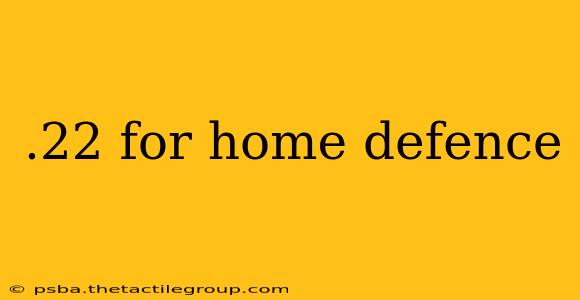The .22 Long Rifle (LR) cartridge is a popular choice for many firearm enthusiasts, known for its affordability and relatively low recoil. However, its suitability for home defense is a topic frequently debated among firearms experts and self-defense advocates. This article will delve into the pros and cons of using a .22LR for home defense, offering a balanced perspective to help you make an informed decision.
The Case for .22LR in Home Defense
While not the first choice for many, the .22LR does possess some advantages in a home defense scenario:
- High Capacity Magazines: Many .22LR firearms, particularly pistols and rifles, offer high-capacity magazines, allowing for a greater number of rounds to be fired before reloading. This can be crucial in a high-stress situation.
- Low Recoil: The incredibly low recoil of the .22LR makes it easier to control, particularly for smaller or less experienced shooters. This is beneficial under the pressure of a self-defense situation where accuracy is paramount.
- Quieter than Larger Calibers: The .22LR is significantly quieter than larger calibers like 9mm or .45 ACP, potentially reducing the risk of hearing damage for the defender and minimizing the disturbance to neighbors. This is especially important in close-quarters scenarios.
- Cost-Effectiveness: Ammunition for .22LR is considerably cheaper than most other centerfire cartridges, allowing for more frequent practice and a larger stockpile of ammunition.
The Arguments Against .22LR for Home Defense
Despite the advantages, significant drawbacks exist when considering the .22LR for home defense:
- Stopping Power: This is the most significant concern. The .22LR cartridge has significantly less stopping power than larger calibers. It may not reliably incapacitate an attacker, requiring multiple hits to achieve the desired effect. Over-penetration is less of a concern, but the lack of immediate stopping power is a critical factor.
- Accuracy at Distance: While manageable at close range, accuracy can suffer at distances beyond 10-15 yards, reducing its effectiveness in larger homes.
- Penetration Limitations: While reduced penetration can be seen as an advantage in densely populated areas, insufficient penetration through barriers (like doors or walls) can also render it ineffective.
Alternative Calibers for Home Defense
If you're looking for a more robust option for home defense, consider these popular and effective calibers:
- 9mm: A versatile and widely available round with excellent stopping power and manageable recoil.
- .45 ACP: A powerful cartridge known for its exceptional stopping power, although with more significant recoil.
- 12 Gauge Shotgun: A devastatingly effective option at close range, offering a high capacity and significant stopping power.
Conclusion: Informed Decision-Making is Key
The decision of what firearm and caliber to use for home defense is intensely personal and depends on various factors, including your physical capabilities, experience level, living situation, and local laws. While a .22LR pistol or rifle might be suitable for some specific situations or individuals (e.g., a very small stature individual with limited upper body strength), it should not be considered the primary or only choice for home defense. A thorough understanding of the limitations and the availability of more effective options should be carefully weighed before making this crucial decision. Always consult with a firearms professional and undergo proper training before handling any firearm.
Disclaimer: This article provides general information and should not be considered professional advice. Always consult with relevant authorities and experts before making any decisions regarding firearms and self-defense. Safe and responsible firearm handling is paramount.

